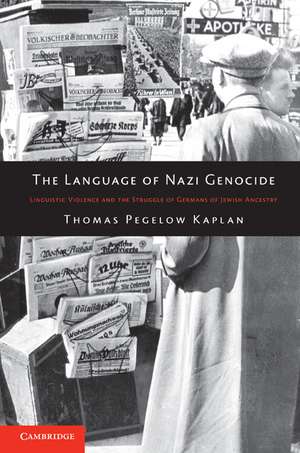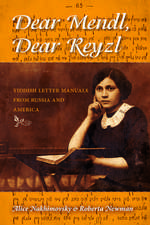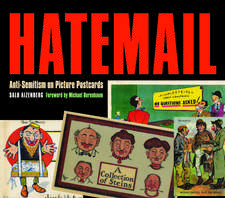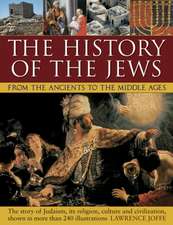The Language of Nazi Genocide: Linguistic Violence and the Struggle of Germans of Jewish Ancestry
Autor Thomas Pegelow Kaplanen Limba Engleză Paperback – 28 aug 2011
| Toate formatele și edițiile | Preț | Express |
|---|---|---|
| Paperback (1) | 237.75 lei 6-8 săpt. | |
| Cambridge University Press – 28 aug 2011 | 237.75 lei 6-8 săpt. | |
| Hardback (1) | 646.91 lei 6-8 săpt. | |
| Cambridge University Press – 23 aug 2009 | 646.91 lei 6-8 săpt. |
Preț: 237.75 lei
Nou
Puncte Express: 357
Preț estimativ în valută:
45.49€ • 47.50$ • 37.65£
45.49€ • 47.50$ • 37.65£
Carte tipărită la comandă
Livrare economică 05-19 aprilie
Preluare comenzi: 021 569.72.76
Specificații
ISBN-13: 9781107650572
ISBN-10: 1107650577
Pagini: 322
Ilustrații: 10 b/w illus. 5 tables
Dimensiuni: 155 x 231 x 23 mm
Greutate: 0.43 kg
Editura: Cambridge University Press
Colecția Cambridge University Press
Locul publicării:New York, United States
ISBN-10: 1107650577
Pagini: 322
Ilustrații: 10 b/w illus. 5 tables
Dimensiuni: 155 x 231 x 23 mm
Greutate: 0.43 kg
Editura: Cambridge University Press
Colecția Cambridge University Press
Locul publicării:New York, United States
Cuprins
Introduction; 1. 'We are all Germans; why then ask for religion …': cultural identity, language, and Weimar pluralism, 1928–32; 2. Towards the 'racial and social boundaries between Germans and Jews are to be strictly drawn …': dictatorship building and the process of Nazifying language, 1933; 3. Towards the eradication of the 'impossible, untenable category of 'German Jews'': enforcing and contesting racial difference, 1935–8; 4. 'The Jewess' attempted to 'state a case on her decent': linguistic violence as part of genocide, 1941–5; 5. 'We are not bad Jews, because we believe we are good and true Germans …': another beginning and persisting difference, 1945–8; Conclusion; Appendix.
Recenzii
'A sensitive, sophisticated, and rigorous analysis of the linguistic violence that accompanied and enabled the Shoah. Pegelow Kaplan uses a vast and diverse array of sources, from press directives to newspapers, diaries, and interviews with survivors, to reveal how, between 1928 and 1948, laws, institutions, and individuals interacted to produce and sometimes contest the Nazi categories of 'German' and 'Jew'. In the process, he speaks in profound and compelling ways to key questions in the study of the Holocaust, about continuity, antisemitism, 'ordinary Germans' and Jewish resistance. Especially valuable is Pegelow Kaplan's consideration of all Germans of Jewish ancestry and his keen ear for the desperation and ingenuity with which people defined as outsiders and targeted for destruction struggled, using everything they had to save their families, their lives, and their selves.' Doris L. Bergen, Chancellor Rose and Ray Wolfe Professor of Holocaust Studies, University of Toronto
'Words can and do kill where messages of hatred become transformed into murderous action. Thomas Pegelow Kaplan's excellent study explores the importance of language for the persecution of Jews during and immediately after the Nazi era without ignoring the reaction of those stigmatized by the rhetoric of racism. This book is crucial for the understanding of the Holocaust and other genocides.' Jürgen Matthäus, Contributor to Christopher Browning's The Origins of the Final Solution: The Evolution of Nazi Jewish Policy, 1939–1942
'In this methodologically innovative and impressively researched book, Thomas Pegelow Kaplan elevates the study of the Nazi regime's manipulation of language to a new level of sophistication and nuance. The book shows how Nazi racial terminology permeated everyday life, not only facilitating the legal and social exclusion of Jews, but also undergirding the violence, and ultimately the genocide, that was perpetrated on them. A great strength of the book is that it couples a detailed analysis of the mechanisms by which the Nazi regime produced racist language with a compelling explanation of how German Jews attempted to cope with, and sometimes resist, the constant linguistic assaults on their Germanness, their dignity, and their humanity.' Alan E. Steinweis, Professor of History and Director, Center for Holocaust Studies, University of Vermont
'… [an] ambitious, original study …' Peter Fritzsche, H-German
'Pegelow Kaplan's mastery of primary and secondary sources is exemplary and his lexometric analysis breaks new ground … this book takes the study of public discourse and successfully shows both its debasement of language and insidious role in forwarding the Nazi's genocidal agenda.' Alan T. Levenson, Central European History
'In a multi-layered analysis, Thomas Pegelow Kaplan attempts to comprehend how the Nazis categorized their racial enemies in the press and how Germans of Jewish ancestry contested and struggled for survival in the midst of this propaganda onslaught … [he] deserves credit for explaining how hatred of the Jews became part of the everyday language of stories and editorial comment in the press.' European History Quarterly
'Words can and do kill where messages of hatred become transformed into murderous action. Thomas Pegelow Kaplan's excellent study explores the importance of language for the persecution of Jews during and immediately after the Nazi era without ignoring the reaction of those stigmatized by the rhetoric of racism. This book is crucial for the understanding of the Holocaust and other genocides.' Jürgen Matthäus, Contributor to Christopher Browning's The Origins of the Final Solution: The Evolution of Nazi Jewish Policy, 1939–1942
'In this methodologically innovative and impressively researched book, Thomas Pegelow Kaplan elevates the study of the Nazi regime's manipulation of language to a new level of sophistication and nuance. The book shows how Nazi racial terminology permeated everyday life, not only facilitating the legal and social exclusion of Jews, but also undergirding the violence, and ultimately the genocide, that was perpetrated on them. A great strength of the book is that it couples a detailed analysis of the mechanisms by which the Nazi regime produced racist language with a compelling explanation of how German Jews attempted to cope with, and sometimes resist, the constant linguistic assaults on their Germanness, their dignity, and their humanity.' Alan E. Steinweis, Professor of History and Director, Center for Holocaust Studies, University of Vermont
'… [an] ambitious, original study …' Peter Fritzsche, H-German
'Pegelow Kaplan's mastery of primary and secondary sources is exemplary and his lexometric analysis breaks new ground … this book takes the study of public discourse and successfully shows both its debasement of language and insidious role in forwarding the Nazi's genocidal agenda.' Alan T. Levenson, Central European History
'In a multi-layered analysis, Thomas Pegelow Kaplan attempts to comprehend how the Nazis categorized their racial enemies in the press and how Germans of Jewish ancestry contested and struggled for survival in the midst of this propaganda onslaught … [he] deserves credit for explaining how hatred of the Jews became part of the everyday language of stories and editorial comment in the press.' European History Quarterly
Notă biografică
Descriere
In the Nazi genocide of European Jews, words made mass murder possible. Thomas Pegelow Kaplan analyzes the role of language.













